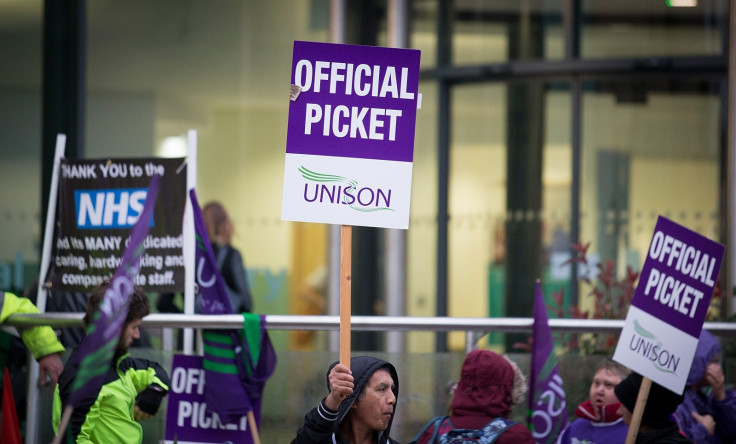NHS Workers Stage Four-Hour Strike for 1% Pay Rise

Thousands of NHS staff workers have started a four-strike as part of a dispute over pay.
The walkout involves thousands of workers from members of nine unions, including the Royal College of Midwives, Unison and Unite.
The strike, which started at 7am in England and 8am in Ireland, is over the coalition government's decision not to implement a 1% pay rise for all NHS staff.
The Department of Health said it could not agree to the pay rise without risking frontline jobs.
The walkout is not expected to affect urgent or emergency care, but pre-booked appointment and non-emergency procedures could be rearranged because of the industrial action.
The strike is the second one to occur at the NHS in the last month following similar action on 13 October, the first strike over pay for 30 years.
Unison leader Dave Prentis said the strike should "sound alarm bells ringing" in Westminster.
He added: "The anger is spreading and so is the public support for health workers' cause. The strength of feeling is far from fading and the dispute far from going away.
"All the government has done so far is threaten workers with job cuts.
"If the secretary of state seriously thinks staff are the NHS's best asset then he needs to treat them fairly.
"We are only asking for decent pay for the hard-working people the government say they care so much about.
"NHS workers in Scotland and Wales will all be getting a 1% pay rise and the Living Wage. So why is the secretary of state so determined to penalise workers in England?
A Department of Health spokesman said: "NHS staff are our greatest asset and we want to make the current pay system fairer - which is why we have put forward proposals that would guarantee all staff would get at least a 1% pay rise this year and next, but these have been rejected by the unions.
"We have taken tough decisions to increase the NHS budget, but we can't afford a consolidated pay rise in addition to increments without risking 10,000 frontline jobs."
Cathy Warwick, chief executive of the Royal College of Midwives, said: "This is not about our members demanding huge banker-sized bonuses, or asking for the similarly large bonuses and pay increases given to many senior managers in the NHS.
"It is about our members having to fight just to get the very modest 1% pay award recommended by the NHS pay review body.
"It is also an award which still lags way behind the rising cost of living and will see our members earning the same in 2016 as they did in 2013."
© Copyright IBTimes 2024. All rights reserved.






